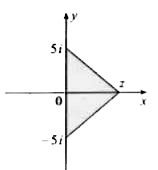Determine the complex numbers which satisfy the equation −i¯z=z2.
To solve the equation −i¯z=z2, we will express the complex number z in terms of its real and imaginary parts. Let's denote z=x+iy, where x is the real part and y is the imaginary part. The conjugate of z is given by ¯z=x−iy.
1. Substitute z and ¯z:
−i¯z=−i(x−iy)=−ix+y
Thus, we can rewrite the left-hand side as:
−i¯z=y−ix
2. Calculate z2:
z2=(x+iy)2=x2+2xyi−y2=(x2−y2)+2xyi
3. Set the two expressions equal:
Now we equate the real and imaginary parts from both sides:
y−ix=(x2−y2)+2xyi
4. Separate real and imaginary parts:
From the equation, we have:
- Real part: y=x2−y2
- Imaginary part: −x=2xy
5. Solve the imaginary part:
From −x=2xy, we can rearrange this to:
2xy+x=0⟹x(2y+1)=0
This gives us two cases:
- Case 1: x=0
- Case 2: 2y+1=0⟹y=−12
6. Case 1: x=0:
Substitute x=0 into the real part equation:
y=02−y2⟹y+y2=0⟹y(y+1)=0
This gives us:
- y=0 or y=−1
Thus, the solutions for this case are:
- z=0+0i=0
- z=0−1i=−i
7. Case 2: y=−12:
Substitute y=−12 into the real part equation:
−12=x2−(−12)2
Simplifying gives:
−12=x2−14⟹x2=−12+14=−14
This is not possible since x2 cannot be negative.
8. Final Solutions:
The only solutions we have found are:
- z=0
- z=−i
Summary of Solutions:
The complex numbers that satisfy the equation −i¯z=z2 are:
z=0andz=−i
−i¯z=−i(x−iy)=−ix+y
Thus, we can rewrite the left-hand side as:
−i¯z=y−ix
z2=(x+iy)2=x2+2xyi−y2=(x2−y2)+2xyi
Now we equate the real and imaginary parts from both sides:
y−ix=(x2−y2)+2xyi
From the equation, we have:
- Real part: y=x2−y2
- Imaginary part: −x=2xy
From −x=2xy, we can rearrange this to:
2xy+x=0⟹x(2y+1)=0
This gives us two cases:
- Case 1: x=0
- Case 2: 2y+1=0⟹y=−12
Substitute x=0 into the real part equation:
y=02−y2⟹y+y2=0⟹y(y+1)=0
This gives us:
- y=0 or y=−1
- z=0+0i=0
- z=0−1i=−i
Substitute y=−12 into the real part equation:
−12=x2−(−12)2
Simplifying gives:
−12=x2−14⟹x2=−12+14=−14
This is not possible since x2 cannot be negative.
The only solutions we have found are:
- z=0
- z=−i
The complex numbers that satisfy the equation −i¯z=z2 are:
z=0andz=−i
Topper's Solved these Questions
- COMPLEX NUMBERSBOOK - A DAS GUPTACHAPTER - COMPLEX NUMBERSEXERCISE - EXERCISE
224 Videos
- Circular Functions, Identities BOOK - A DAS GUPTACHAPTER - Circular Functions, Identities EXERCISE - Exercise
300 Videos
- Continuity, Differentiability and Graph of FunctionBOOK - A DAS GUPTACHAPTER - Continuity, Differentiability and Graph of FunctionEXERCISE - Exercise
38 Videos
Similar Questions
Knowledge Check
The complex number z satisfying the equation |z−1|=|z+1|=1 is
A0B1+iC−1+iD1−iThe complex numbers z = x + iy which satisfy the equation ∣∣∣z−5iz+5i∣∣∣=1, lie on
 Athe x - axisBthe straight line y = 5Ca circle passing through originDNone of these
Athe x - axisBthe straight line y = 5Ca circle passing through originDNone of theseThe complex numbers z = x + iy which satisfy the equation ∣∣∣z−5iz+5i∣∣∣=1, lie on
 Athe x-axisBthe straight line y = 5Ca circle passing through the originDnone of these
Athe x-axisBthe straight line y = 5Ca circle passing through the originDnone of these
If z is a complex number which simultaneously satisfies the equations
3|z−12|=5|z−8i| and |z−4|=|z−8|, where i=√−1, then Im(z) can be
View SolutionFind the complex number z such that it satisfies the equation, 2¯z+3+5i=iz
View SolutionThe complex number z which satisfy the equations |z|=1 and ∣∣ ∣∣z−√2(1+i)z∣∣ ∣∣=1 is: (where i=√−1 )
View SolutionFor every real number a≥0, find all the complex numbers z that satisfy the equation 2|z|−4az+1+ia=0
View SolutionFind a complex number z satisfying the equation z+√2|z+1|+i=0.
View Solution
